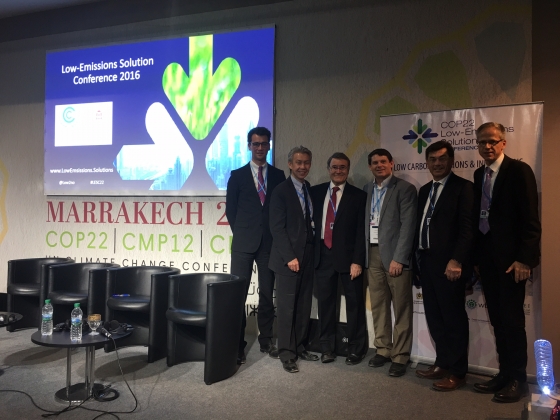
The chairman of ADEX represented Spain as Featured Innovator in the “Smart Low Carbon and Sustainable Cities” session of the UN Climate Change Conference, COP22 “Low Carbon and Sustainable Cities”, held at Marrakesh from the 14th to Wednesday the16th of November. The goal of the Conference was to assist the nations in the technical preparation of their National Determined Contributions (NDCs) and Low-Emission Development Strategies (LEDS) and establish the implementation of the Paris Agreement. With the aim of bringing out all the creative and innovative technology solutions for a low emissions future, this conference has gathered experts, innovators, engineers and concerned professionals able to promote the use of new technologies and design efficient implementation at country level for LEDS. Besides creating the debate around LEDS and national pathways, the conference has covered innovation in fields concerned with the issue of emissions such as clean energy, transportation, agriculture, construction, industry, (including carbon capture, storage and usage) in addition to the role of ICT and process control in the efforts to combat climate change. Regarding this last point, the ADEX chairman presented a video that described the potential use of Adaptive Predictive Expert (ADEX) control technology for emissions reduction in the climatization area. Energy consumed globally for space heating is equivalent to that produced by 1,000 coal-fired power plants of 1,000 MW each. The use of ADEX technology can reduce by more than 15% the energy consumption for space heating while maintaining optimal comfort. If the solution were to be applied globally, it could save more than 5 Exajoules annually (equivalent to the annual energy produced by 150 coal-fired power plants) and 387 MegaTn of CO2 emitted per year. The round table discussion considered the disruptive nature of ADEX technology and future significance for Industry and Society due to its adaptive self-tuning capability, adjusting to process time-varying dynamics and achieving optimized performance, minimizing the consumption of resources (such as energy) and environmental impact. The featured innovators who participated in the round table discussion are gathered in the attached picture, from left to right, Christian Von Oldshausen (Germany), founder and leading scientist of Sunfire; K.C. Tran (USA), founder of Carbon Recycling International; Juan M. Martín Sánchez (Spain), professor of UNED and Chairman of ADEX (Spain); Adrian Corless (Canada), executive director of Carbon Engineering; Jon Agust Thorteinsson (Iceland), founder of Marorka, and George Markowz (Germany), leading scientist of Evonik.
